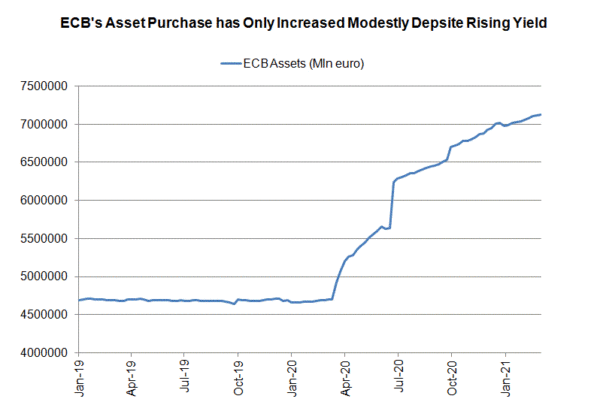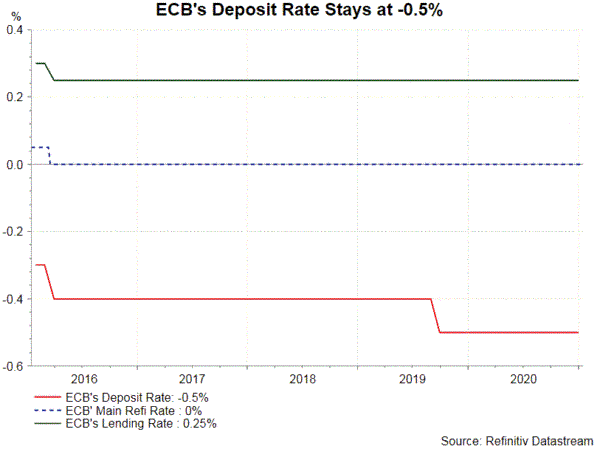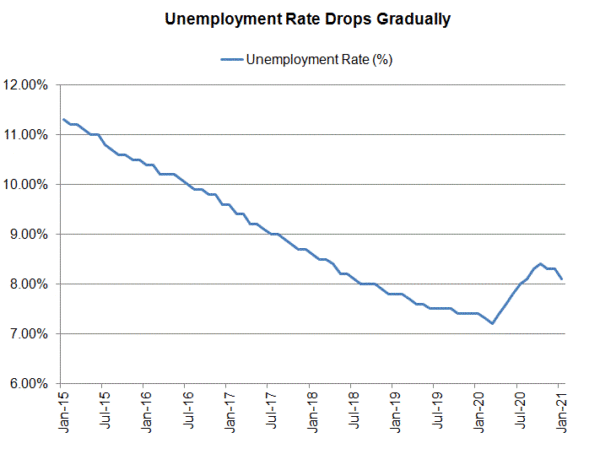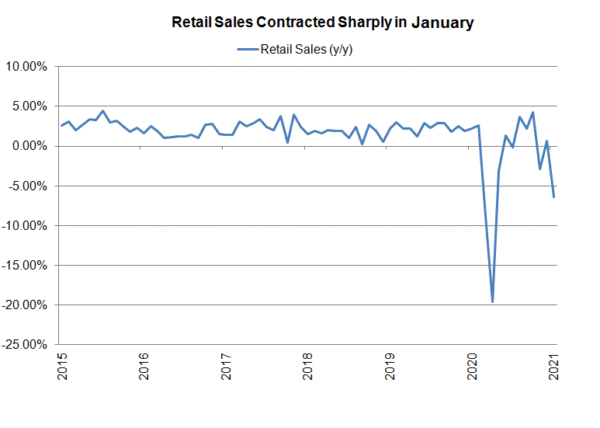Macroeconomic developments have changed significantly since the January ECB meeting. One of the most prominent developments is the rise in inflation expectations and bond yields. As the ECB has pledged to maintain a accommodative monetary policy, it would be of great interest to the market as to how it is going to handle the unwarranted tightening in financial conditions. First quarter economic activities came in worse than expected, due to renewed lockdown measures and delayed vaccination schedule. We expect the staff to revise sharply lower GDP growth forecast for 1Q21. Inflation projections should, however, be upgraded in light of the recent developments. On the monetary policy, we expect all measures to stay unchanged.
Reflationary trades have sent global yields since February. While this phenomenon is more remarkable in US Treasury, European yields have also increased a lot. For instance, German 10-year bund yield has increased to -0.28% on March 9 from -0.52% after the January meeting. Such growth-driven increase has nonetheless tightened financial conditions, in contrast with ECB’s pledge to keep financial conditions accommodative.
A number of policymakers have commented on the issue. Yet, there appears no consensus on how to handle the problem. Panetta noted the “undesirable contagion from rising US yields into the euro area yield curve”. He added that “if unaddressed, this would lead to a tightening of financing conditions that is inconsistent with our domestic outlook and inimical to our recovery”. Meanwhile, Lane warned that “an excessive tightening in yields would be inconsistent with fighting the pandemic shock to the inflation path”, while Schnabel suggested that “a rise in real long-term rates at the early stages of the recovery, even if reflecting improved growth prospects, may withdraw vital policy support too early and too abruptly given the still fragile state of the economy. Policy will then have to step up its level of support”. The viewpoints are, however, countered by some hawks in the council. For instance, Knot noted that “the rise in rates reflects better growth prospects and higher inflation expectations and that in itself is a positive”. Weidmann also argued that ”the size of the movements is not such that this is a particularly worrisome development”. He added that “the PEPP has that flexibility embodied in it so we can react to unwarranted tightening of financing conditions”.
We expect the ECB to shed more light on this issue and how (whether) it will use the PEPP in response to the rise in yields. There is minimal need to increase the size of the programme, given the envelope of 1.85 trillion euro. However, it is possible for the central bank to accelerate the purchase from the current 15B per week to, say 30B per week. Other monetary policy measures will stay unchanged with the Asset Purchase Program (APP) (traditional QE) at 20B euro/ month and the deposit rate at -0.5%.


On the economy, the preliminary reading shows that headline CPI stayed unchanged at +0.9% y/y in February, missing expectations of 1%. Core CPI eased to +1.1% y/y from January’s +1.4%. In light of the expectations that global economic recovery should accelerate in the second half of the year, inflation should gather momentum later. This could make ECB’s December projections (Headline inflation at +1% and +1.1% in 2021 and 2022, respectively), obsolete. On the job market, the unemployment rate stayed unchanged at 8.1% in January, better than consensus of 8.3%. However, this remained elevated and is way above pre-pandemic level of 7.2%. Household consumption worsened significantly. Retail sales contracted -6.4% y/y in January, following a +0.9% gain in the prior month. The market had anticipated a milder contraction of -1.2%. From a month ago, retail sales also plunged -5.9%, much worse than consensus of -1.1% and December’s +1.8% growth. This signals that GDP in 1Q21 should fall to contraction, making a double-dip in the economic trajectory. In December, the ECB projected GDP growth to come in at +3.9% in 2021 and +4.2% in 2022. It also forecast a +0.6% q/q in 1Q21. We believe a downward revision on the above forecasts is needed.


